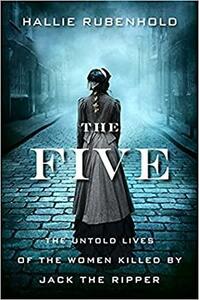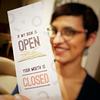Take a photo of a barcode or cover
emotional
informative
sad
medium-paced
challenging
dark
emotional
informative
reflective
sad
medium-paced
dark
emotional
informative
sad
slow-paced
I've been meaning to read this for years and gosh it was worth the wait.
dark
emotional
informative
reflective
sad
medium-paced
informative
sad
slow-paced
I have never annotated more than I did while reading this book and that's not something I usually do anyway.
It's clear that a lot of research was done in order to write it and there's so much to reflect upon after reading this.
I'm very glad I read it. It's a book club pick and I probably wouldn't have read it for myself otherwise. I did take a long time to finish and it felt a little dense and dry at times but I expected that.
I really appreciate all the work that went into discovering more about each of the women's life stories. It humanised them and painted a very different picture than I had prior to reading the book. All of their stories were so sad but fascinating to read.
On the other hand, I didn't think the Mary Jane chapters were as good. I understand she's the one with the most obscure past out of the 5 but there seemed to be a huge amount of speculation and inference in her chapters.In particular the sex trafficking part. We got a lot of information about what that looked like in the late 1800s but the author didn't really present any evidence to suggest that that is what happened to Mary Jane. I'm not sure we should put that much stock into Barnett's stories from what we were told about him. And even he didn't really know anything himself. I read this chapter twice too see if I'd missed something but I don't think we can conclude Mary Jane was trafficked to Paris based on the info mation the book provided.
I always knew I wasn't cut out to live in Victorian London and this book has definitely confirmed that idea. Everything was so bloody grim. The 20th and 21st centuries aren't great but, as a woman and a human, I'm definitely happier here, thank you. 🙌
It's clear that a lot of research was done in order to write it and there's so much to reflect upon after reading this.
I'm very glad I read it. It's a book club pick and I probably wouldn't have read it for myself otherwise. I did take a long time to finish and it felt a little dense and dry at times but I expected that.
I really appreciate all the work that went into discovering more about each of the women's life stories. It humanised them and painted a very different picture than I had prior to reading the book. All of their stories were so sad but fascinating to read.
On the other hand, I didn't think the Mary Jane chapters were as good. I understand she's the one with the most obscure past out of the 5 but there seemed to be a huge amount of speculation and inference in her chapters.
I always knew I wasn't cut out to live in Victorian London and this book has definitely confirmed that idea. Everything was so bloody grim. The 20th and 21st centuries aren't great but, as a woman and a human, I'm definitely happier here, thank you. 🙌
dark
informative
slow-paced
Alright, praise first: this book is fantastic for giving the social, political, and moral context for the Ripper killings. It's chock full of historical information and has a ton of references to primary sources. The prose is good, nothing special, but good, solid, educated writing. The concept is good too; it was really interesting to learn more about the Ripper victims than simply how they died.
Rubenhold paints a clear picture of the stark realities of the time with tidbits like this: "On one occasion, health inspectors found five children sharing a bed alongside a dead sibling awaiting burial." Chilling stuff, and I like that she doesn't sensationalize such tragedies but merely presents them to the reader.
On the debit side, and this outweighs the credit quite a bit for me, Rubenhold clearly has a thesis, and she is willing to bend facts to breaking point to support it. She believes that Jack the Ripper, rather than targeting prostitutes, was simply attacking vulnerable women who were sleeping rough, and in fact, most of the women killed were not prostitutes at all.
I don't mind her having an opinion, but her arguments are often weak, and the idea of the women not being prostitutes is actually irrelevant to the book she's written.
She puts forward the facts that none of the victims had sex with their killer, that there were no signs of struggle, and no screams were heard as evidence that the murdered women were not sex workers. None of these facts preclude prostitution, only rape.
She berates the police for assuming that the women were prostitutes because they were poor and because of where they were found. I agree that it shouldn’t have been taken as read, but given the locale and the poverty level, it wasn’t an unreasonable working hypothesis.
In her account of Annie Chapman, she states that “virtually all that is known about Annie Chapman’s life in Whitechapel is drawn from this morass of confused ‘facts’ reported in the newspapers.” In spite of this, she presents her account of Annie’s time in Whitechapel as certainty, not as guesswork or probable inferences. Then, too, mere paragraphs after justifiably throwing doubt over the news reports, she cites those same reports without question, caution, or qualifier because they happen to support her argument that Annie was not a prostitute. Things like this annoyed me enough that quite minor instances of overstating her case or being very certain in her language began to grate on my nerves. A lot of reasonable assumptions are given as facts, and that more or less killed this book for me.
In her conclusion, Rubenhold asserts “the belief that ‘Jack the Ripper was a killer of prostitutes’... does not bear scrutiny,” but I must disagree. By her own account, most of the victims were prostitutes at one time or another, and even if they weren’t, they were killed in an area known for prostitution in a time when social mores equated poverty with sex work; Jack may well have thought them prostitutes when he killed them.
The dogged determination to assert that Jack the Ripper wasn’t killing prostitutes sinks this book, and it’s a shame, because the research is great, the material is interesting, and the goal to humanize women who are usually regarded as footnotes in their own deaths is admirable! Further on in the conclusion, she states, “The victims of Jack the Ripper were never ‘just prostitutes’; they were daughters, wives, mothers, sisters, and lovers. They were women. They were human beings, and surely that in itself is enough.” I fervently wish that she had taken this as her thesis!
The book is worth reading for the history, but you do need to ignore a lot of very obviously manipulative language.
challenging
dark
emotional
informative
sad
medium-paced
An incredible account of the unfortunate women who led difficult lives and had a terrible end.
informative
medium-paced





